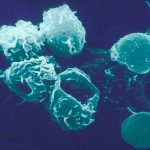Lien vers Pubmed [PMID] – 11673512
J. Immunol. 2001 Nov;167(9):5034-41
Transplants of tissues depleted of passenger leukocytes are upon in vitro culture usually accepted in allogeneic recipients. Accordingly, fully allogeneic embryonic thymic epithelium was suggested to be poorly immunogenic. However, this tissue is capable of inducing donor-specific tolerance to peripheral tissues, when restoring T cell development in nude mice, through the production of regulatory cells. In the present work, adult immunocompetent allogeneic recipients were grafted with embryonic tissues isolated at stages before hemopoietic colonization or even before the establishment of circulation. Allogeneic thymic epithelium of day 10 embryos and heart primordium of day 8 embryonic donors were always rejected. Acute rejection of the thymic anlagen takes place in less than 12 days, with maximal CD4(+) and CD8(+) T cell infiltrates at 10 days post-transplant. In addition, a significant infiltrate of NK1.1(+) cells is observed, although without any essential role in this process. Furthermore, recipients lacking the indirect pathway of Ag presentation to CD4(+) T cells do not reveal any significant delay in rejection, even when CD8(+) T cells are also eliminated. Thus, our experimental approach reveals acute allograft rejection in the absence of all known pathways of naive T cell activation and therefore unveils a novel graft rejection mechanism that should be mediated by direct recognition of parenchymal cells. Given the importance of dendritic cells in naive T cell activation, it is likely that cross-reactive memory T cells may also drive rejection.


